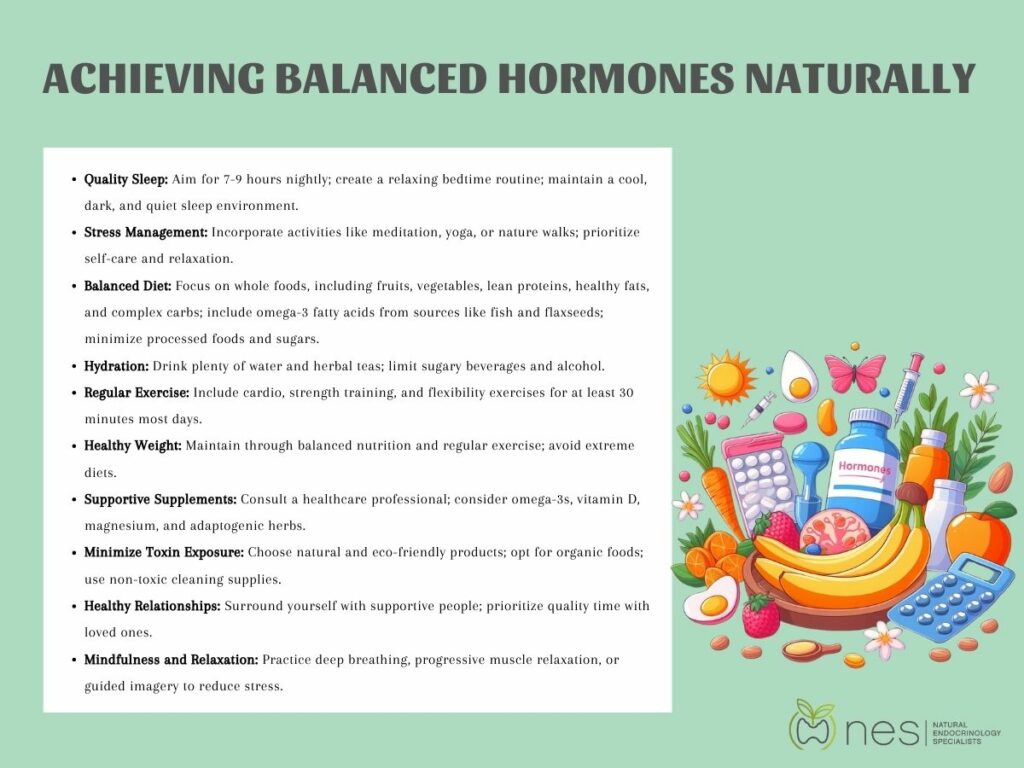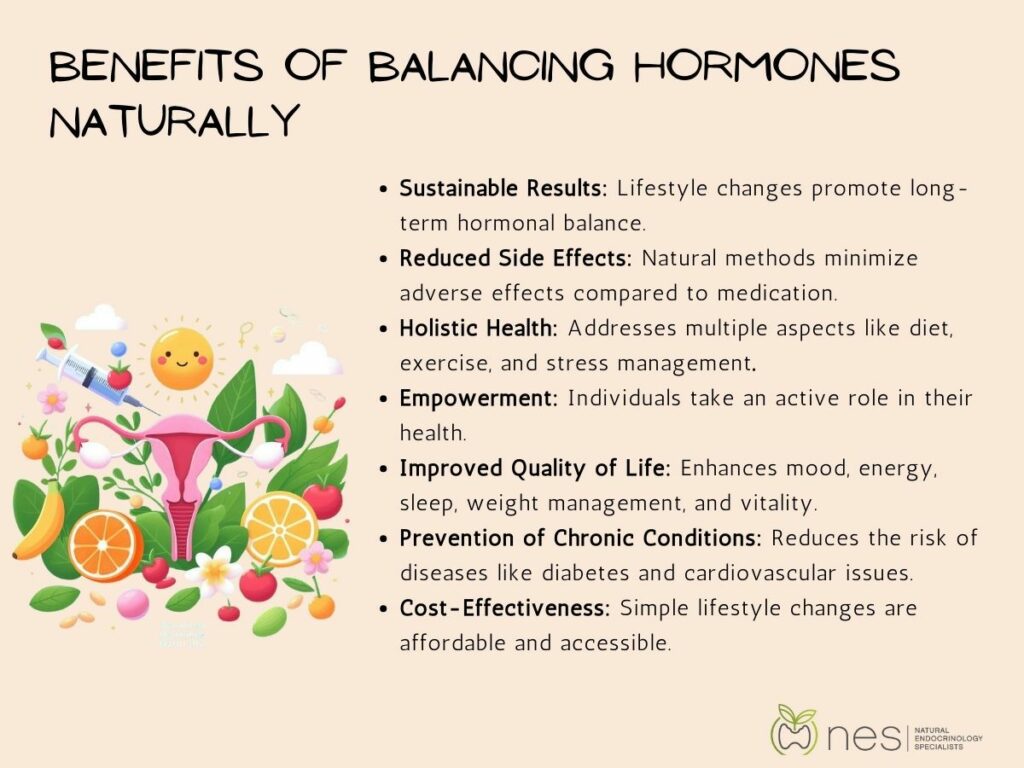Hormones play a crucial role in maintaining various bodily functions, from metabolism and mood regulation to reproductive health and immune system function. When hormones are out of balance, it can lead to a wide range of health issues, including weight gain, fatigue, mood swings, and reproductive problems. We will now look at lifestyle tips and […]

Hormones play a crucial role in maintaining various bodily functions, from metabolism and mood regulation to reproductive health and immune system function. When hormones are out of balance, it can lead to a wide range of health issues, including weight gain, fatigue, mood swings, and reproductive problems.
We will now look at lifestyle tips and strategies to balancing hormones naturally. While medical interventions are sometimes necessary, there are also many natural approaches to help balance hormones and promote overall well-being. In this article, we'll explore lifestyle tips and strategies for naturally balancing hormones.
Achieving hormonal balance is key to overall health and well-being. Hormones regulate numerous bodily functions, including metabolism, mood, reproductive health, and more. While hormonal imbalances can arise due to various factors, adopting certain lifestyle strategies can help promote natural balance.
Here are some effective lifestyle tips for achieving hormonal harmony:

Quality sleep is essential for hormonal regulation. To support the body's natural rhythms, aim for 7-9 hours of uninterrupted sleep each night. Keep your bedroom cool, dark, and quiet to create a conducive sleep environment. Establish a relaxing bedtime routine to signal to your body that it's time to wind down.
Chronic stress can disrupt hormone levels and contribute to imbalances. Incorporate stress-reducing activities into your daily routine, such as meditation, deep breathing exercises, yoga, or spending time in nature. Find healthy outlets for stress, and prioritize self-care practices that promote relaxation and well-being.
Nutrition plays a crucial role in hormone balance. Focus on consuming a balanced diet rich in whole foods, including fruits, vegetables, lean proteins, healthy fats, and complex carbohydrates. Include sources of omega-3 fatty acids, such as fatty fish and flaxseeds, which support hormone production and reduce inflammation. Minimize processed foods, refined sugars, and excessive caffeine intake, which can disrupt hormonal equilibrium.
Proper hydration is essential for optimal hormone function. Drink plenty of water throughout the day to support cellular processes and hormone transport. Herbal teas and infused water are also hydrating options. Limit consumption of sugary beverages and alcohol, which can interfere with hormone balance and hydration levels.
Regular physical activity is beneficial for hormone balance and overall health. Incorporate a variety of exercises into your routine, including cardiovascular activities, strength training, and flexibility exercises. Aim for at least 30 minutes of moderate-intensity exercise most days of the week to support hormonal regulation and promote well-being.
Excess body weight, particularly visceral fat around the abdomen, can contribute to hormone imbalances. Strive to maintain a healthy weight through a combination of balanced nutrition and regular exercise. Focus on making sustainable lifestyle changes rather than pursuing short-term fad diets or extreme exercise regimens.
Certain supplements may help support hormone balance, but it's essential to consult with a healthcare professional before starting any new regimen. Omega-3 fatty acids, vitamin D, magnesium, and adaptogenic herbs like ashwagandha are among the supplements that may support hormonal health. Choose high-quality supplements from reputable sources and follow recommended dosages.
Toxins found in the environment, household products, and personal care items can disrupt hormone function. Minimize exposure to toxins by choosing natural and eco-friendly products whenever possible. Use non-toxic cleaning supplies, personal care products free of harmful chemicals, and opt for organic foods to reduce pesticide exposure.
Positive social connections and supportive relationships can positively influence hormone balance and overall well-being. Surround yourself with friends and family who uplift and encourage you. Prioritize quality time with loved ones and engage in activities that foster meaningful connections.
Incorporate mindfulness and relaxation practices into your daily routine to reduce stress levels and promote hormonal balance. Techniques such as deep breathing exercises, progressive muscle relaxation, and guided imagery can help activate the body's relaxation response and counteract the effects of chronic stress.
Achieving hormonal balance requires a holistic approach that addresses various aspects of lifestyle, including sleep, stress management, nutrition, exercise, and environmental factors.
By adopting healthy lifestyle habits and making informed choices, you can support your body's natural ability to achieve hormonal harmony and promote overall health and well-being. Remember to listen to your body's cues, prioritize self-care, and seek professional guidance when needed on your journey to hormonal balance.
Balancing hormones naturally offers numerous benefits for overall health and well-being. Unlike relying solely on medication or medical interventions, natural methods aim to address the root causes of hormonal imbalances and promote the body's innate ability to restore equilibrium.
Here are some key benefits of balancing hormones naturally:

Natural approaches to hormone balance focus on making lifestyle changes that promote overall health and well-being. By adopting healthy habits such as nutritious eating, regular exercise, stress management, and adequate sleep, individuals can achieve sustainable results that support hormonal balance over the long term.
Many pharmaceutical medications used to treat hormonal imbalances come with potential side effects. Natural methods, on the other hand, typically have fewer adverse effects because they work with the body's natural processes rather than introducing foreign substances. By choosing natural approaches, individuals can reduce the risk of experiencing unwanted side effects.
Balancing hormones naturally often involves addressing multiple aspects of health, including diet, exercise, stress management, sleep, and environmental factors. By taking a holistic approach to health, individuals can experience a wide range of benefits beyond hormonal balance, including improved energy levels, mood, digestion, and immune function.
Natural methods empower individuals to take an active role in their health and well-being. By learning about the factors that influence hormonal balance and making informed choices about diet, lifestyle, and self-care practices, individuals can take control of their health and manage hormonal imbalances more effectively.
Balancing hormones naturally can lead to improvements in various aspects of life, including mood, energy levels, sleep quality, weight management, and overall vitality. By achieving hormonal balance, individuals may experience enhanced well-being, increased resilience to stress, and a greater sense of vitality and fulfillment.
Hormonal imbalances are often associated with an increased risk of chronic health conditions such as diabetes, cardiovascular disease, thyroid disorders, and reproductive health issues. By addressing hormonal imbalances naturally, individuals can reduce their risk of developing these conditions and promote overall health and longevity.
Natural methods of balancing hormones often involve simple lifestyle changes and self-care practices that are accessible and affordable for many people. Compared to pharmaceutical medications and medical interventions, which can be costly and may require ongoing treatment, natural approaches can be a cost-effective way to support hormonal balance and overall health.
Balancing hormones naturally offers numerous benefits, including sustainable long-term results, reduced risk of side effects, holistic health benefits, empowerment and self-management, improved quality of life, prevention of chronic health conditions, and cost-effectiveness.
By adopting healthy lifestyle habits, managing stress, and seeking appropriate medical guidance when needed, individuals can support hormonal balance and naturally promote optimal health and well-being.
Balanced hormones are essential for maintaining overall health and well-being. They play a crucial role in regulating various physiological processes, ensuring the proper functioning of the body.
When hormones are in balance, the body can function optimally, promoting overall health and well-being. Balanced hormones are necessary for regulating metabolism, mood stability, reproductive health, growth and development, immune function, sleep quality, stress response, and maintenance of internal stability.
Overall, balanced hormones are vital for optimal health and function of the body.
In conclusion, the significance of balanced hormones in maintaining overall health and well-being cannot be overstated. Balanced hormones are crucial for optimal physiological functioning, from regulating metabolism and mood to supporting reproductive health and immune function.
By understanding the importance of hormonal balance and adopting lifestyle habits that promote it, individuals can take proactive steps toward achieving and sustaining their health goals. Prioritizing factors such as nutritious eating, regular exercise, stress management, adequate sleep, and environmental considerations can all contribute to maintaining balanced hormones naturally.
Ultimately, embracing holistic approaches to health empowers individuals to support their body's innate ability to achieve hormonal harmony, enhancing vitality, resilience, and longevity.

Acupuncture Session - $189.00
Acupuncture, Package of 4 - $636.00
Female Pellet Insertion Package - $518.00
Male Pellet Insertion Package - $744.00